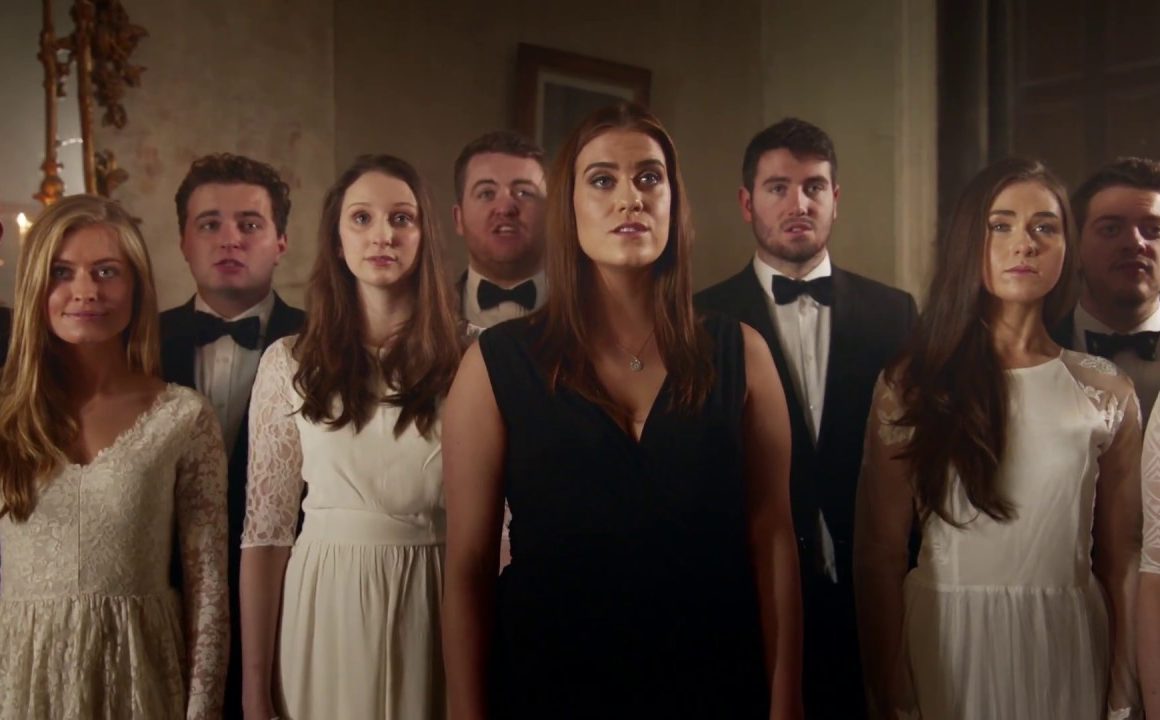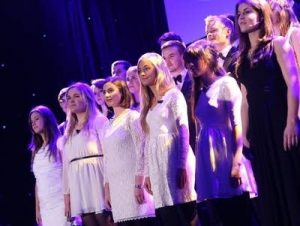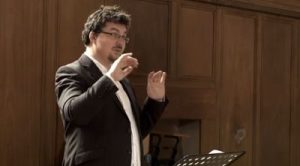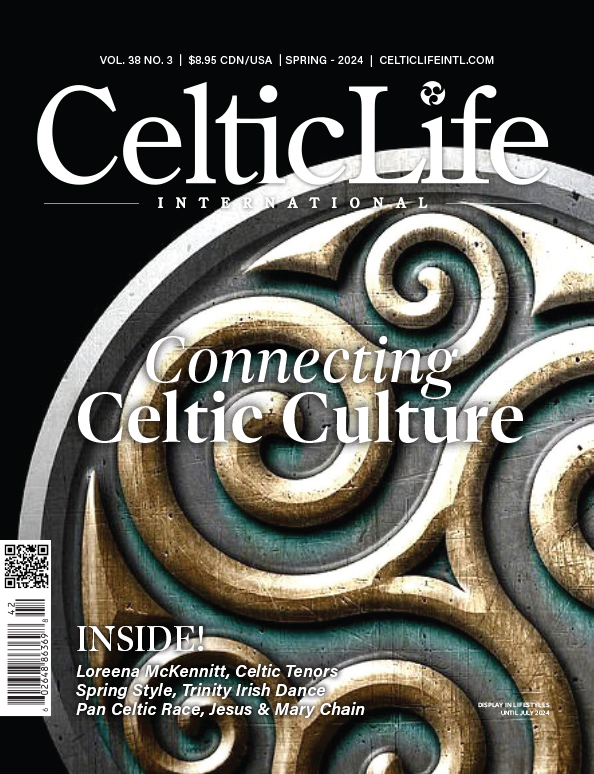
A dream comes true as the Choral Scholars of University College Dublin take the stage at Carnegie Hall in NYC this Thursday night Thursday. Recently, we spoke with Artistic Director Desmond Earley about his profession and his passion for his musical troupe.
What is your own background?
Dublin city is my hometown. I was born not far from Christchurch Cathedral and St. Patrick’s Cathedral in Dublin, near where Messiah, Handel’s great oratorio was first performed on Fishamble Street in 1742, and just down from St. James’ Gate, the site of the Guinness brewery!
Where do you currently reside?
My time is split between Dublin, Ireland, and Portland, Oregon in the United States.
What inspired you to get involved with music?
As a young lad I had the opportunity to take piano lessons and to train as a chorister in a church choir where we sang works by Benjamin Britten, Johann Sebastian Bach and other composers. In that vein I just learned how to read music, essentially by immersion, by singing repertoire. When my voice broke I concentrated more on keyboard instruments, studying classical organ with the late (and great) Peter Sweeney at Dublin Institute of Technology in Dublin, going on to study music after school at University College Dublin. Harpsichord became my main instrument of study, and I considered myself fortunate to study it to doctoral level at the Royal Irish Academy of Music with David Adams, and for a period at MDW in Vienna with Prof. Gordon Murray. The academic study of music is just as important to me as studying the performance element: the two aspects merge and feed off each other, particularly when considering historical music as there are issues of style that arise. Not everything is written on the page–notation is not perfect–so one has to learn the secrets of the past! These are some of the things which have inspired me and which I like to teach the students as part of their study as a choral scholar.
Are they the same reasons that you continue to be involved today?
My position at University College Dublin allows me to work with some of Ireland’s brightest and most talented young people. They are so committed to excellence that I cannot help but feel inspired in turn by them each time we rehearse.

What are the challenges of the vocation?
Running a university chamber choir on our island on this side of the Atlantic is really interesting because we have a mix of scholarship models: the scholarship model similar to that found in the UK, but for the fact that we are a concert chamber choir and not a church choir. In this we are similar to many university choirs in the United States: in a way we’re sort of mid-Atlantic, as it were, between two worlds. The fact that there are scholarship students in my ensemble lessens the challenge of having to rely on volunteers; the scholarship helps encourage a higher standard in the choir. Auditions for the group seem to be very popular and there is always a little competition for a place at the beginning of the year. As a university choir we experience turnover of members; some of our most talented people leave at the end of every year and we have to rebuild the experience and skill in the next year group. We seem to be doing something right because the standard of the choir has grown steadily over the last ten years in particular. The primary challenge is definitely the turnover of members, but the reward is that I get to witness new members grow as musicians in each batch.
What are the rewards?
The biggest reward has to be a sense of achievement for the students. We hear very positive feedback from our Alumni about their experiences in the group. Being part of the Choral Scholars has helped many in the next stage of their lives, whether they go on to a professional musical career or keep music close to their heart as an amateur. Being a choral scholar impacts on other aspects of their work life: discipline, focus and being part of a team are all things that transfer to any workplace and many of them have remarked upon that to me. Watching their confidence grow and seeing them achieve wonderful things is very rewarding indeed.
What have been some career highlights?
For me, performing in Carnegie Hall is going to be a highlight for sure; I think for every musician on the planet that is a particular milestone! Certainly, as a conductor – and also a harpsichordist – conducting a period-instrument performance recently with Monica Hugget’s Portland Baroque Orchestra in Oregon was a great experience. As a matter of fact, the project was a performance of Handel’s oratorio Messiah, a work very dear to me as I was born very close to the site of the original performance, which always gets a smile from an orchestra when I tell them! The release of our first disc, Invisible Stars, was equally a proper highlight, as it validated the work we were doing and it proclaimed that our voice was actually quite interesting, that it has a unique aspect and that it was worthy of a recording and worldwide distribution. As a composer, being asked to write a piece of music by an America radio station–KQAC All Classical Portland–was a great honour! Their contemporary music host, Robert McBride, invited me to create the soundtrack for the progress of the total solar eclipse across Oregon in August 2017 (the piece is called Body of the Moon with the Italian texts taken from the writings of Galileo Galilei in Italian). I worked with an alt-pop improviser to shape the English text. It was a very interesting project. To know that people were listening to my music as they experienced that phenomenon, with their car doors open in the desert and, to coin a phrase from a Mason Bates aria, looking up, well, that was truly amazing.
When and why did you first get involved with the choir?
As founding Artistic Director I have been involved since the inception of the group. At University College Dublin we had no history of choral scholarships but in April 1999 a conversation with one of the Deans of Residence, Kieran McDermott, made real the idea that it would be a good idea for us to have some choral scholars to cover events on campus. It started off as a church choir, but then it quickly developed its ambassadorial role, and the choir began to be invited to perform at college functions and events. It grew from there.
 What is the ensemble’s core mandate?
What is the ensemble’s core mandate?
Choral Scholars is about students from across the university, across different disciplines, coming together to share in really-excellent choral music in a collegiate and collaborative environment, with a focus on commissioning new music, bringing that to life and representing Ireland across the world. They really have a unique formation; the identity is created by studying western classical Art Music, all the standard repertoire from Schütz, Fauré and Bach to contemporary compositions and re-imaginings of traditional folk music arranged for choir. We have recently emphasized the idea of commissioning new works from internationally renowned composers, which has changed the artistic experience. The group has a gentle national identity and is committed to artistic excellence. I hope that I continue to inspire them in that way, but there’s also a joyfulness about being in the choir and that is evident when you see the students perform. I am extremely proud of what they have achieved!
What can audiences expect from performances, and what is the response like?
This is a very busy time. We are preparing for our Carnegie Hall debut on March 15th in New York, where we will present a program of Irish choral music. The material will be taken from repertoire on our new disc on the Signum label, Perpetual Twilight, and that is released on the March 1st. The program will also contain material from our first album, Invisible Stars, so listeners will hear a mix of contemporary Irish choral music written by Irish composers, international composers setting Irish poetry, and the re-imagining and reshaping of traditional song for ensemble. I like to think of the selection as Irish to the core, refreshingly modern, and reassuringly familiar too. When we perform internationally, and indeed when people unfamiliar with the Irish language watch our videos online, we are always struck by the response. People, many of whom have no connection to Ireland or the language, feel deeply moved by what the group are performing. It is a humbling experience for us.
What makes a good song?
Perhaps it is not so much about the song: we can spend time analyzing a song and break down what makes this song ‘a good song’, but actually it is really about the heart and soul of the performer and how they make that song their own; how they put across the song; how they wear and how they break it in. It must become their song. If a singer can bring intention and emotional experience then that surely is good delivery. Songs are really gifts from somebody else, something to pay forward to other people, but unlike a secret (which belongs to the teller) a song belongs to the listener.
Is your creative process more inspirational or ‘perspirational?’
Anyone who works as a creative will tell you that discipline is very important and the commitment to a regular schedule of writing or composition or rehearsal is crucial. Of course, the balance here is that sometimes a walk with the dog will provide the next fragment of a tune, or an idea for a project, or the shape of what the next recording might be. So sometimes there is inspiration. Oftentimes, to transform what is a good idea the shoulder must go to the wheel, to put in the hours and wipe the sweat off the brow.
From your perspective, are young people still interested in choral music?
To me it seems like young people at University College Dublin are interested in choral music because I see them spending so much time together making music! Perhaps we have inspired other young people around the world, through social media: we know that many choirs around the world have purchased the scores of arrangements of songs that Choral Scholars have performed. They seem to be interested in performing the music themselves… so many of these groups tend to be college choirs. More generally, choral music is having a renaissance all over the world, and the benefits of singing together as a group, both physically and mentally, have been scientifically proven. It is great to be part of such a positive movement!

Is enough being done to preserve and promote Irish culture generally?
I think it is. The Irish government is committed to investing in the arts, and we have a president who is a huge advocate of the cultural sector, and music in particular. Private donors are crucial, and we have been most fortunate in our friends! In Ireland we are in a unique situation: we have such a diaspora across the world and the nature of that diaspora tends to result in a focus on Irish culture and a commitment to Irish sports, games and culture abroad. This is a significant help in terms of preserving and promoting Irish culture outside Ireland. I think we are doing our part for the Irish language in our selection of songs, but perhaps more can be done.
What is on your musical agenda for the rest of 2019 and beyond?
We are celebrating twenty years of choral scholarships at University College Dublin in a concert setting at the National Concert Hall (Dublin) on the April 25th this year, followed by planning and writing new music for the next recording. We are also very excited about making our Australian debut July 2020!






















A very talented young man with a brilliant future and a wonderful gentleman with music in his soul